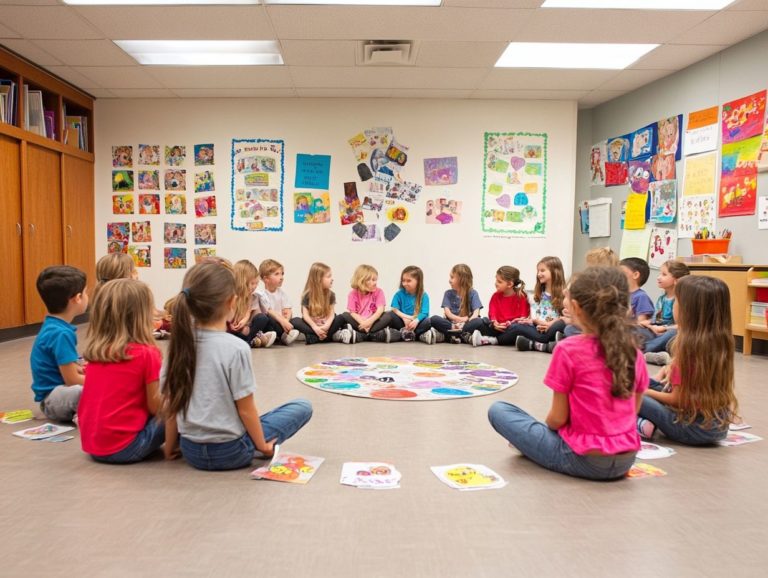What are Common Misconceptions about Mindful Parenting?
Mindful parenting is a transformative approach that encourages you to be fully present and engaged with your child. This fosters emotional well-being for both of you. Influenced by the principles of Buddhism and mindfulness, this approach supports a calm family life.
As this parenting style continues to gain traction, misconceptions about mindfulness can cloud its true essence.
This article delves into the real meaning of mindful parenting. It highlights its importance in today s fast-paced world while debunking common myths that may hold you back from embracing this enriching practice.
You ll uncover practical strategies to deepen your connection with your child. You ll also nurture your own growth as a parent. These mindful practices can help you navigate many parenting challenges and foster a nurturing environment.
Contents
- Quick Insights
- What is Mindful Parenting?
- Why is Mindful Parenting Important?
- Common Misconceptions about Mindful Parenting
- 1. Mindful Parenting is the Same as Permissive Parenting
- 2. Mindful Parenting is Only for Parents with Young Children
- 3. Mindful Parenting is Time-Consuming
- How to Practice Mindful Parenting
- Key Practices for Mindful Parenting
- Frequently Asked Questions
Quick Insights

- Mindful parenting is not the same as permissive parenting, which focuses on avoiding conflict and giving in to children’s demands. It involves being present, engaged, and setting appropriate boundaries for the child’s well-being.
- Mindful parenting is not limited to parents with young children. It is a parenting approach that can be practiced at any stage of a child’s life to promote their emotional, mental, and social development.
- Mindful parenting does not have to be time-consuming. It can be incorporated into everyday activities and interactions with your child, making it a natural and sustainable practice for busy parents.
What is Mindful Parenting?
Mindful parenting, steeped in the principles of mindfulness and influenced by Buddhism and teachings of Thich Nhat Hanh, invites you to immerse yourself fully in the present moment with your children. This approach nurtures emotional awareness. It helps promote thoughtful parenting.
It s all about being present, observing emotions and thoughts without judgment. Creating a nurturing environment promotes the dynamic development of your child. Weaving mindful practices into your daily interactions fosters a serene family life. This is possible even amid parenting challenges.
Why is Mindful Parenting Important?
Mindful parenting is essential for cultivating a serene family environment. It enables you with the tools to navigate many parenting challenges with grace.
By embracing mindfulness, you increase your awareness of your mental state and emotional responses. This paves the way for improved managing emotions for both you and your children. This heightened consciousness fosters healthier interactions and nurtures dynamic child development, ultimately guiding your children toward becoming resilient and emotionally intelligent individuals. Influential figures like family psychologist Dr. Brad Sachs and authors like Carla Naumburg have emphasized the importance of these practices.
Common Misconceptions about Mindful Parenting
Misconceptions about mindful parenting persist. These create confusion regarding its true essence and advantages. Many individuals mistakenly equate mindfulness with permissive parenting or assume it s exclusively suited for parents with exceptional coping skills. However, mindful parenting focuses on awareness of thoughts and emotions, aiming for a balanced approach.
There s a common belief that mindful parenting demands a significant time commitment or is only pertinent for those with young children. By dispelling these myths surrounding parenting, including meditation misconceptions, you can truly transform your understanding of how conscious parenting and emotional awareness can enrich families at every stage of life. Curious how this can change your family dynamics?
1. Mindful Parenting is the Same as Permissive Parenting
One of the most enduring parenting myths is the notion that mindful parenting equates to permissive parenting. This misconception often leads to confusion for those seeking effective parenting techniques.
While both approaches prioritize your child s emotional well-being, they diverge significantly in method and outcome. Mindful parenting invites you to be fully present and attentive to your child’s emotions. It also recognizes the vital role of setting clear boundaries.
Take, for example, a situation where your child throws a tantrum in a store. A mindful parent acknowledges the child’s feelings but firmly explains why a candy bar isn t an option. This approach models essential control over emotions.
On the other hand, permissive parenting tends to lack crucial boundaries. A permissive parent might give in to the child s demands to sidestep conflict, leaving the child ill-prepared for the disappointments of real life.
By examining these scenarios, you can gain a deeper appreciation for blending structure with empathy in your mindful parenting journey. Parenting experts like Dr. Brad Sachs advocate for this balance to address real-life challenges effectively.
2. Mindful Parenting is Only for Parents with Young Children
One prevalent misconception is that mindful parenting solely pertains to parents of young children. This unfortunate belief neglects its relevance across all stages of child development.
In truth, the principles of mindful parenting offer remarkable benefits for parents of toddlers, school-aged children, and even teenagers. As your children grow, their emotional and psychological needs will evolve, prompting you to adapt your parenting strategies accordingly.
Mindful parenting cultivates emotional awareness, enabling you to better comprehend your children’s feelings and behaviors. Carla Naumburg’s Stress-Less Parenting Club provides resources to help parents at all stages.
For example, toddlers greatly benefit from your ability to soothe their heightened emotions. Meanwhile, teenagers often require thoughtful discussions that recognize their complex thoughts and feelings.
By embracing mindfulness, you enhance your connection with your children on a deeper level. This connection fosters resilience and strong communication skills that are fundamental for nurturing healthy relationships throughout their lives.
Imagine how mindful interactions tailored to each age group can significantly impact their emotional development!
3. Mindful Parenting is Time-Consuming

Many parents think that practicing mindful parenting is a time-consuming endeavor. This belief might deter them from embracing these invaluable techniques.
However, integrating mindfulness into your daily routines can be done effortlessly, without needing to carve out lengthy periods for meditation.
Consider this: you can take just a few moments each day during breakfast or bedtime to engage in deep breathing exercises alongside your children. This simple act helps everyone stay present.
You can also savor the textures of food, share gratitude for the day’s highlights, or enjoy a quiet stroll while observing nature. These small yet significant practices create a mindful environment.
By reducing reliance on technology and practicing gadget-free parenting, you create more opportunities for mindful interactions.
By incorporating these mindful actions, you nurture a strong connection within your family. This emphasis on being present in each moment ultimately cultivates emotional resilience for everyone involved.
How can you implement these practices in your daily routine to enhance your family s connection?
Misconception 4: Mindful Parenting is Only for Parents with Good Coping Skills
Many believe that mindful parenting is reserved for those who already have strong coping skills. This belief can discourage parents from seeking the help they need. It misses the essence of mindfulness; it s not merely a tool for the skilled but a pathway for all parents to cultivate vital coping mechanisms over time.
By incorporating mindful practices into your routine, you can significantly enhance your emotional regulation the ability to manage your emotions allowing you to navigate stressful situations with increased calm and clarity. As you nurture your own mental well-being through mindfulness, you naturally model these behaviors for your children, helping to instill resilience and emotional intelligence in them. Influential figures like Angulimala in Buddhist teachings emphasize the power of mindfulness in transforming behaviors.
This mutual development strengthens the bond between you and your child, creating a supportive space where both of you can thrive and adapt together.
Misconception 5: Mindful Parenting is Only for Parents with Perfect Children
The misconception that mindful parenting is only suited for parents of children who seem perfect might hold you back from fully embracing these transformative practices.
In reality, mindful parenting provides invaluable support as you navigate the often complex challenges that arise with your children. By cultivating emotional awareness, you can become more attuned to both your feelings and those of your children, leading to a deeper understanding of your emotional exchanges.
Heightened awareness fosters a calm presence, enabling you to defuse tension during difficult moments and promote effective communication. Ultimately, these practices not only enhance your individual well-being but also contribute to a caring atmosphere where cooperation and empathy flourish, paving the way for more harmonious family dynamics.
Misconception 6: Mindful Parenting is Only for Parents with a Lot of Money
There s a common belief that mindful parenting demands a hefty financial investment, but that s a significant misconception that undermines its availability to everyone.
At its core, mindful parenting thrives on emotional awareness and intentional interactions, not in how much money you spend. By prioritizing genuine connections over material comforts, you can create an environment that nurtures empathy, understanding, and presence.
Simple yet impactful practices like engaging in active listening when conversing with your children or dedicating moments to undistracted play can profoundly elevate the quality of your family relationships. These approaches focus on being fully present, offering rich emotional benefits that can significantly strengthen the bond between you and your children, all without stretching your budget.
You can start today without spending a dime!
How to Practice Mindful Parenting
Mindful parenting involves various mindfulness practices, including meditation and intentional interactions. By integrating these techniques, you can foster a nurturing and resilient family environment.
Practicing mindful parenting means integrating a range of techniques designed to cultivate emotional awareness and enrich your present experience with your children. These mindful practices invite you to engage more deeply with your kids, fostering a harmonious relationship and a serene family environment.
By embracing these techniques, you can navigate the challenges of parenting with greater ease, ultimately promoting healthier emotional development and a calm family life for your children.
Key Practices for Mindful Parenting
1. Be Present and Engaged with Your Child
Being present with your child is key to mindful parenting. It fosters emotional regulation and strengthens your bond.
To achieve this, you can adopt practical strategies like practicing active listening. This means really paying attention to what your child says without interrupting. This approach conveys to your child that their thoughts and feelings matter. It also helps you better understand and empathize with their experiences.
Accepting feelings is crucial during this practice, allowing you to create mindful interactions. Minimizing distractions such as silencing your phone or turning off the TV during conversations creates a more inviting environment for meaningful interactions.
This form of gadget-free parenting encourages mindfulness in your interactions. By embracing these practices, you can significantly enhance your emotional awareness and responsiveness. Ultimately, this leads to deeper connections and a richer understanding of your child’s needs.
2. Practice Self-Compassion and Self-Care

Practicing self-compassion and self-care is crucial for you as a parent. These practices sustain your emotional well-being and enhance your mindfulness.
By making self-care a priority, you cultivate a healthier emotional environment for yourself. You also set a powerful example for your children. Engaging in mindfulness practices daily can significantly improve your mental state.
Self-care routines whether it’s immersing yourself in a beloved hobby, getting in a good workout, or savoring a peaceful moment help you manage stress. This increased awareness allows you to connect more deeply with your feelings, enabling you to respond thoughtfully rather than simply react.
Being an aware parent in these moments sets a great example for children. When you weave self-compassion into your daily life, it allows you to embrace imperfections. This shift leads to more patient and understanding relationships with your children, supporting personal growth for both you and them.
3. Understand Your Child’s Perspective
Understanding your child’s perspective is an essential aspect of mindful parenting. It enhances emotional awareness and fosters dynamic child development.
By cultivating empathy, you can create a nurturing environment where your child feels safe to express their emotions and thoughts. Techniques like reflective listening allow you to fully engage with what your child communicates, validating their feelings without judgment.
This approach encourages open communication, enabling your child to articulate their worries and thoughts. This is instrumental in developing their emotional literacy. Understanding misconceptions about mindfulness can also aid in this process.
Embracing this conscious parenting style strengthens the bond between you and your child. It equips them with the tools they need to navigate their emotions as they grow.
4. Set Boundaries and Be Consistent
Setting boundaries and maintaining consistency in parenting is essential for you as a mindful parent. This approach supports emotional regulation and fosters healthy relationships.
When you take the time to articulate clear expectations, you provide your children with a sense of direction. This helps them appreciate the importance of responsibility and accountability. Clear boundaries and consequences create a safe space for your child to thrive!
A mindful approach encourages you to be empathetic and attentive to your child’s emotional needs while upholding those standards. Striking this balance between structure and support nurtures trust, allowing your child to feel safe enough to express themselves openly and honestly.
Ultimately, your consistency in applying these boundaries reinforces a stable environment. This helps your children thrive emotionally and develop healthy interpersonal skills.
In summary, implementing these practices creates a more mindful parenting experience. The benefits include stronger connections, improved emotional awareness, and a nurturing environment where both you and your children can grow together.
5. Communicate Effectively with Your Child
Effective communication stands as a cornerstone of mindful parenting, enriching emotional awareness and helping you navigate the challenges that come with raising children. Understanding the mental state of both the parent and child is crucial in this process.
When you adopt strategies like using ‘I’ statements, you cultivate an atmosphere where your children feel safe to express their feelings and thoughts. By articulating your own emotions and needs without assigning blame, you promote transparency within the family dynamic. This approach opens the door to meaningful dialogue, allowing your children to share their perspectives in a respectful manner. Dr. Brad Sachs, a family psychologist, emphasizes the importance of these communication techniques.
This leads to a relationship with your child that is more collaborative and understanding. These communication techniques not only enhance your daily interactions but also nurture emotional intelligence in your children, equipping them for future social situations and ultimately enriching the entire family experience.
6. Be Open to Learning and Growing as a Parent
Embracing a mindset of learning and growth as a parent is essential in the practice of mindful parenting, cultivating an environment that thrives on emotional awareness and managing your emotions. Carla Naumburg, author of “Mindful-Ish Parenting,” advocates for this approach.
As you navigate this journey of adaptability, you not only refine your own skills but also serve as a powerful example of resilience for your children. This commitment to evolution invites you to explore a variety of resources, whether through workshops, insightful reading like the works of Thich Nhat Hanh or Carla Naumburg, or connecting with fellow parents in groups such as the Stress-Less Parenting Club.
By actively seeking feedback from peers and professionals, you open yourself to diverse perspectives. This ensures that your parenting strategies meet the unique needs of each child. Ultimately, this openness paves the way for conscious parenting, fostering deeper emotional connections and nurturing trust within the parent-child relationship.
Frequently Asked Questions
Let s explore some common misconceptions about mindful parenting that many parents face today:
-
What are Common Misconceptions about Mindful Parenting?
One common misconception is that mindful parenting requires a lot of time and effort. In reality, it’s about being present and aware in the moment, which can actually save time and energy in the long run. Awareness of thoughts and emotions helps in making the process smoother.
-
Does Mindful Parenting Mean Never Getting Angry?
Another misconception is that mindful parenting means never getting angry or frustrated with your child. This is not true. Mindful parenting is about acknowledging and managing your emotions in a healthy way, rather than suppressing them. It’s about mindfulness and emotional management rather than emotional suppression.
-
Is Mindful Parenting Only for “Perfect” Parents?
Some people believe that mindful parenting is only for “perfect” parents. However, anyone can practice mindful parenting, regardless of their background or parenting style. It’s about being open to learning and improving, not about being perfect. Carla Naumburg’s “Mindful-Ish Parenting” provides insights into this.
-
Is Mindful Parenting a New-Age Concept?
Many people also think that mindful parenting is a new-age or hippie concept. In reality, it has been practiced by cultures around the world for centuries. Buddhism, for instance, emphasizes mindful practices. It’s all about being intentional and fully present in your interactions with your children, not about following a specific trend.
-
Is Mindful Parenting Only for Young Children?
Some may believe that mindful parenting is only for young children, and that older children or teenagers are too difficult to parent mindfully. However, the principles of mindful parenting can be applied to children of all ages and can even improve relationships with older children and teens. Understanding parenting myths can help in applying these principles more effectively.
By addressing these misconceptions, you can gain a clearer understanding of what mindful parenting truly involves and how it can benefit your family!
What are Common Misconceptions about Mindful Parenting?
Many people mistakenly believe that mindful parenting means indulging every whim and desire of your child. This misconception can lead to confusion about what mindful parenting truly entails.
In reality, mindful parenting involves setting clear boundaries while remaining understanding and caring. It s a way of parenting that balances discipline with compassion.






